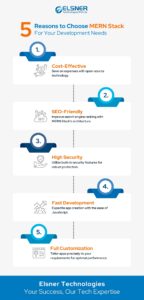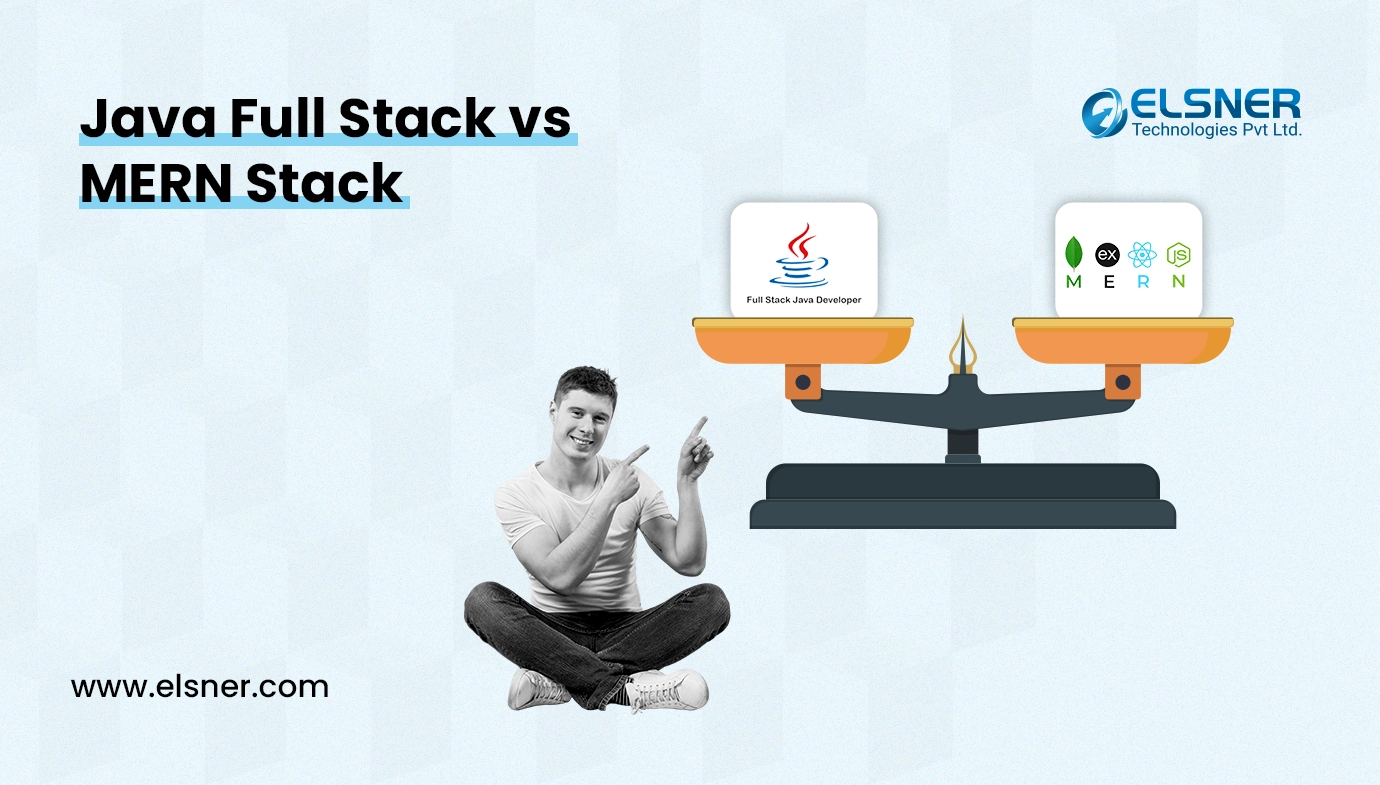- Importance of Performance Optimization
- How to Optimize Your MERN Stack Application – 8 Useful Tips!
- Tip #1: Client-Side Optimization
- Tip #2: Front-End Framework Optimization
- Tip #3: Server-Side Optimization
- Tip #4: Network Optimization
- Tip #5: Monitoring and Profiling
- Tip #6: Security and Code Optimization
- Tip #7: Database Performance
- Tip #8: Testing and Benchmarking
- Why Should We Choose MERN Stack for Building Applications?
- 1. Cost-Effective
- 2. SEO-Friendly
- 3. High Security
- 4. Fast Development
- 5. Full Modification
When it comes to building dynamic web applications, the most preferred choice in today’s world is MERN (MongoDB, Express.js, React, Node.js) Stack technology. It’s popular because of its fast development and smooth user experience. But one of the most essential parts of an application is the speed because it can make or break the application’s purpose. So, if you’re planning to build a dynamic MERN stack application, then you need to be aware of some helpful tips to optimize your MERN Stack app performance to get the maximum output. Here, we’ve covered the complete guide on optimizing your MERN Stack app performance. Let’s dive in!
Importance of Performance Optimization
According to statistics, one in four users abandon a web app if it takes more than four seconds to load. It clearly shows how speed is now becoming an essential part of web development. It can make or break the web app performance and affect users’ experience, satisfaction, engagement, and overall end results. If your web app has fast and responsiveness, then it gives a seamless experience that leads to fast SERP ranking, customer satisfaction, and more time usage.
Especially if you’ve used MERN Stack technology for your web app development, then having a high-performance speed can do wonders and provide an unforgettable experience to users with the combination of performance, features, and a user-friendly interface in one place. However, many people didn’t have an idea to boost performance, and not anymore. Let’s explore some useful tips to optimize your web app performance!
How to Optimize Your MERN Stack Application – 8 Useful Tips!
Here are some some useful tips that you can implement in different areas to optimize your MERN stack application:
Tip #1: Client-Side Optimization
1) Code Splitting:
First, you should split your code into small parts and load them on demand. So that users can interact with the MERN stack application much faster after reducing its initial load size.
2) Lazy Loading: In your MERN Stack-based apps, you need to implement lazy loading for easy components and routes. It helps to reduce the load time and allows users to load only those necessary components that they want to access.
3) Minimize and Bundle Javascript: In order to increase your app performance, you need to minimize the number and size of Javascript files to reduce its load times. To make a bundle of your Javascript code, you can use tools like Webpack.
4) Client-side Caching: Start implementing client-side caching with the help of tools like Service Workers and Browser cache, and it serves assets locally, which can subsequently reduce the load time.
5) Optimize Images: It’s essential to compress and optimize the images to reduce their file size and keep the images qualitative without losing the quality. You can use responsive images and the lazy loading option on those images where the image takes time to load.
Tip #2: Front-End Framework Optimization
1) Server-Side Rendering (SSR):
It’s one of the essential parts of optimizing the app performance by rendering the HTML on the server. You can consider implementing SSR for the applications.
2) State Management: You should opt for state management libraries like Redux or MobX for efficient management of the React applications. When you manage the state efficiently, you can easily prevent unnecessary re-renders.
3) React Performance: There are various tools available, like React Profiler, that help you identify and improve your app performance. You just need to follow the best strategies for smooth MERN stack development.
Tip #3: Server-Side Optimization
1) Database Indexing:
If you want to boost your MERN stack application performance, then you need to optimize database queries by indexing frequently accessed fields. It helps to reduce the query execution time and improve the app’s performance.
2) Use a Reverse Proxy: To use a reverse proxy server, there are various platforms available, including Nginx or Apache, for analyzing static assets and handling load balancing. It’s the simplest way to reduce the load and boost overall performance.
3) Load Balancing: Load balancing is required when your web app has a high amount of traffic and slows down its performance. Then, you should set up load balancing to request across multiple Node.js instances. It enhances your app performance and ensures reduced redundancy.
4) Caching: Implementing a server-side caching mechanism like Redis can help your app frequently access data in memory. It reduces the chances of getting repeated database queries and boosts overall response time.
Tip #4: Network Optimization
1) Compression:
You need to enable server-side compression in order to compress the HTTP response size. Some of the popular compression methods that you can prefer in your application are GZip and Brotli.
2) Reduce Round Trips: Try to minimize the number of network requests and focus on using techniques like data prefetching, inlining critical CSS, and reducing unnecessary API calls.
3) Content Delivery Network (CDN): Also, you need to focus on utilizing a Content Delivery Network (CDN) to distribute assets globally and reduce the geographic latency in different regions for their users.
Tip #5: Monitoring and Profiling
1) Error Tracking:
There are various tools available that you can use for error tracking in your web apps, like Sentry or Rollbar. These tools can help you identify and address the key issues that are actually lowering the performance. So that you can identify and resolve/remove the issue for smooth and fast performance.
2) Performance Monitoring: Start implementing performance monitoring and profiling tools in your web apps, such as New Relic and AppDynamics, to continuously analyze your app’s performance and get valuable insights.
Tip #6: Security and Code Optimization
1) Code-splitting and Tree-shaking:
You can use code-splitting and tree-shaking methods to remove the insured code from your web app. It helps to take off the load, reduce the size of your MERN stack application, and boost overall performance.
2) Security Best Practices: Follow the standard security best practices to protect your MERN stack application from any kind of vulnerabilities and cyber attacks such as cross-site scripting (XSS) and SQL injection.
Tip #7: Database Performance
1) Use Aggregation:
If you’ve used MERN stack application development, then you’ll get a powerful feature of aggregation. It allows you to perform complex queries and data processing on the server to reduce the data transfer to the client-side server.
2) Database Indexing: Indexing is a great option to improve database performance by indexing frequent queries and making sure to keep monitoring over time when your MERN stack application upgrades.
3) Data Modeling: You must design your data models efficiently by accounting for the types and volumes of data to handle it. Also, normalize the data wherever it is essential and denormalize the data for performance gains.
4) Connection Pooling: You can use connection pooling to reuse and manage database connections efficiently. Because it helps to minimize the overhead of creating a new database connection for each request.
Tip #8: Testing and Benchmarking
1) Load Testing:
Start performing load tests on your app to check its performance under various levels of traffic to analyze its capacity. There are various tools you can consider for load testing, including Apache JMeter and Artillery for heavy load testing.
2) Benchmarking: You need to benchmark your app to establish performance measurement by comparing the impact of optimization and improvement against the baseline.
Why Should We Choose MERN Stack for Building Applications?
Here are some major reasons to consider MERN Stack for your web and mobile app development:
1. Cost-Effective
MERN Stack is an open-source technology that is built on JavaScript, and that makes this technology cost-effective for web and app development. Because there are no licensing fees or hidden charges associated with this technology, you can freely use and distribute it.
2. SEO-Friendly
MERN is SEO-friendly, and if your web and application are built with the MERN technology, then they are easily indexed by search engines like Google, Yahoo, etc.
3. High Security
It’s one of the secured technologies that allow you to build your web and app with security measurements to prevent any internet threats. Also, you can use MongoDB and Node.js security tools.
4. Fast Development
MERN Stack technology helps you develop mobile apps or web apps much faster because it’s very easy to learn if developers have experience with JavaScript.
5. Full Modification
MERN Stack technology allows you to do full customization during the mobile app or web app development, which makes this technology more preferred by developers.
Wrapping Up!
MERN Stack technology is here to stay, and its demand will keep growing. So, if you’re using MERN Stack to build your web or mobile apps, then you can implement our given working methods to optimize the apps and boost performance. We hope this guide helps you know the true potential of the MERN stack application, its benefits, and how you can optimize your app performance. Now, it’s your turn to hire a MERN stack developer, start building your web or mobile app with MERN technology, and implement the given methods to boost its performance.

About Author
Tarun Bansal - Technical Head
Tarun is a technology enthusiast with a flair for solving complex challenges. His technical expertise and deep knowledge of emerging trends have made him a go-to person for strategic tech initiatives. Passionate about innovation, Tarun continuously explores new ways to drive efficiency and performance in every project he undertakes.





